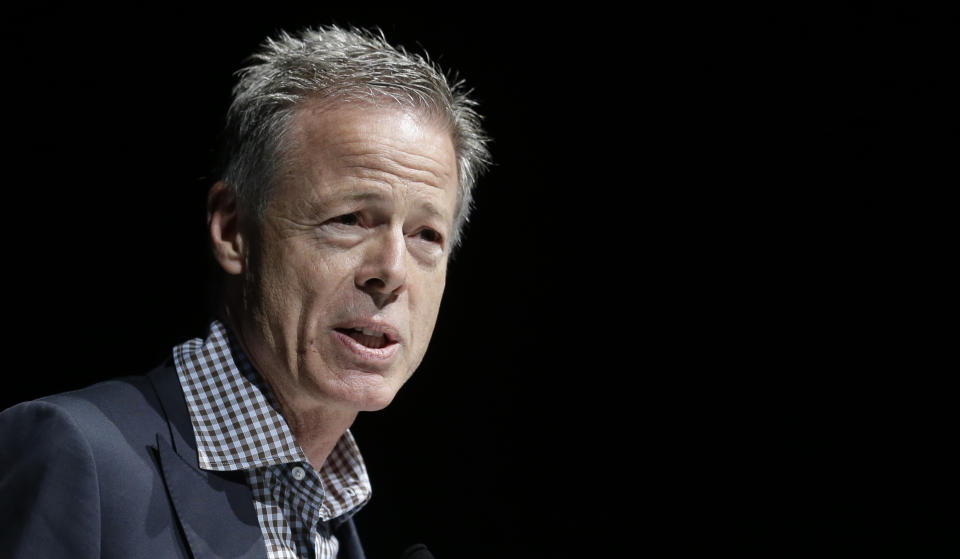The AT&T Time Warner deal is an old-fashioned morality play
By John Huey
When Rupert Murdoch’s 21st Century Fox Corp. (FOX) launched an unwanted takeover bid of $85 a share for Time Warner Inc. (TWX) a couple of years ago, onlookers quickly jumped to the conclusion that Time Warner, and its CEO Jeffrey Bewkes, were toast.
After all, here was the rapacious media swashbuckler of the modern age pulling his frigate up alongside this battered old ship of the line, demanding to board. How could the mild-mannered Bewkes possibly block his way?
Murdoch appeared to wage his battle mostly in the press. Bewkes, the headlines suggested, was acting against the interests of his shareholders, blocking the offer out of ego, pride, self-preservation. Ignoring the noise, Bewkes took his case to his board and the street—Wall Street—with two simple reasons for rebuffing the bid: One, the company is worth much more than $85 a share (as high as $125 he argued). Two, Rupert’s offer—long on 21st Century stock, short on cash, and burdened with debt—isn’t really $85 a share. In fact, Bewkes argued, Rupert isn’t so much attempting to buy Time Warner as he is trying, in effect, to unload his company—and its lagging stock—on Time Warner shareholders. The board bought Bewkes’s no-nonsense case and moved on.

Now, as we can see from his agreement over the weekend to sell Time Warner to AT&T (T) for $107.50 a share, or $85 billion, Bewkes was anything but sentimental about his job, or his company and its ultimate disposition. He wanted a higher price and more cash. He got both. This offer, which is 50% cash/50% stock, is a 35% premium over the pre-offer stock price, and, adjusting for all the various differences, is actually 60% higher than the rejected Fox bid of two years ago.
Those are the cold, hard facts view of what’s happened here. But you can also view the 27-year saga of the company called Time Warner (mostly) as a 21st century morality play, with Jeff Bewkes cast in the roll of Equity, the allegorical character who replaced Justice in some 16th century dramas of this sort.
In this play, the AT&T/Time Warner deal is payback for two disastrous “mega deals” of the past in which the original Time Inc. shareholders lost tremendous equity and leverage. First, in 1990, came Warner Communications’ Steve Ross, who flipped a “merger of equals” into a company controlled by Ross—a clunky deal that overvalued Warner stock, undervalued Time Inc. stock, and laid on a huge pile of debt.
More famously—a decade later—came AOL. At the height of dotcom mania, AOL paid $164 billion in its stock for the assets of Time Warner, a deal that two years later yielded a one-year loss of $99 billion, a record at the time. Bewkes, who was around for every chapter of this saga, deemed the AOL deal “the biggest mistake in corporate history,” and seemed determined not to repeat anything like it.
Through this lens, you can view Bewkes’s entire nine-year run at the helm of Time Warner as a single-minded focus on securing “equity” for the oft abused Time Warner shareholders, a determination to secure a full value deal—one that left them with a pile of money and absolved them of any financial risk in sorting the tangled tech-driven future of the entertainment media business. This focus helps explain not only the AT&T deal, but also the unimpassioned dispatch with which he shed division after division: first Warner Music, then AOL, then the giant Time Warner Cable, and, finally, the shrinking publisher Time Inc. He was, it turns out, always a seller.
Bewkes is not, as some of his flashier Hollywood detractors choose to believe, just some Ivy League bean counter set loose in the dream factory. Deerfield Academy, Yale, Stanford M.B.A.? Yes. But he is a genuine financial intellectual, a guy who revels in explaining intricate debt/equity structures, valuation formulae, and net present value cash flow—often using his passion for military strategy in the first World War as a way of driving home his points. Failing that, he is quick to employ numerous memorized swatches of dialog from all “The Godfather” movies. In fairness, he was also once a very savvy television executive, having run HBO as its CEO during the golden age of such iconic hits as the “Sopranos.” Somewhat arrogant in affect, he’s not everyone’s cup of tea, but he’s also not the guy to try and bully with a half-baked, underpriced takeover offer.
In full disclosure, I worked at Time Inc., which became part of Time Warner, for 24 years, and for a brief time I reported directly to Bewkes as part of an executive committee. While I experienced the vagaries of the company myself as an employee, a journalist, and a shareholder, I no longer have any financial interest in, or business dealings with, Time Warner.
The epic saga of Time Warner began in 1923 with the coincidental founding of Time Magazine and Warner Brothers. Throughout the history of both companies, and later the combined enterprise, Time Warner and its predecessor companies (including Turner Broadcasting, acquired in 1996) have been fierce innovators. Among the concepts they either invented or popularized along the way: “talking pictures,” the zip code, the DVD, satellite broadcast TV, pay TV, cable news, HD broadcast—even email. For all that, Time Warner is not a consumer brand that will be missed by the public; most people today still think it’s a cable company.
This AT&T deal, should it consummate, will be different from all those before it. Having bought and sold giant divisions for decades now, Time Warner is finally selling itself lock, stock, and barrel to another, much larger company, in an entirely different industry. Bewkes has made it clear that he has no desire to stick around except as a short-term facilitator. He has done his job. He dismantled a somewhat dysfunctional media holding company, polished it up as a state-of-the art television company, and then sold it at a very high price. For Bewkes, that is the end of the morality play. Exit stage left.

What AT&T will do with it now really is anyone’s guess except, of course, CEO Randall Stephenson, who surely has an idea of what comes next. A graduate of the University of Central Oklahoma with an MBA from Oklahoma University, he is a former Bell Telco guy, having come up through the ranks of Southwestern Bell, which eventually bought and took the name of what was left of the old AT&T. With 133 million wireless customers, he’s in a strong position if wireless really is the future of video. And he’s also built a good stake in the television distribution business with his 25 million video subscribers at the company’s U-verse service and his last big acquisition, satellite broadcaster DirectTV.
Whatever that future is, no one at this stage is likely to explain it in any detail or candor. In the case of Comcast—another big broadband distributor that decided to diversify into programming by purchasing NBC Universal (valued at $30 billion)—CEO Brian Roberts simply hired a veteran entertainment executive, Steve Burke, to run the whole thing. Stephenson could go that route, or promote someone from Time Warner’s existing executive ranks, or turn it over to an AT&T exec, or buy yet another entertainment company. It’s foolish to speculate.
It isn’t so foolish to speculate, however, on the stampede this mega merger is likely to set off within the industry, on multiple fronts for many reasons. This is the beginning of a bonanza for the big media investment bankers. Herbert Allen, whose firm represented Time Warner in the initial shapings of this deal, should call an emergency winter version of his famous Sun Valley elephant bump just to speed things up—and for the pure spectacle of it.
First, there is the matter of the price Bewkes obtained for his portfolio. At $107.50, his stock would shoot overnight past industry darling Disney (DIS), which is trading in the low 90s these days after passing $120 a little over a year ago. CEO Bob Iger has yet to convince the Street that he has solved the issue of ESPN and its threat from cable unbundling and so-called over-the-top competition. The AT&T acquisition of Time Warner’s sports assets at Turner, plus AT&T’s cash to buy more, won’t help ease that pressure. Iger will be feeling the heat to get the stock back up. Should he buy something big? Break his company into parts? Try to block this merger? All of the above?
Then there’s the concept of Time Warner’s HBO in the hands of mobile distribution giant AT&T. HBO is the pioneer and avatar of paid premium TV programming, and has made a credible tech effort at staving off the streaming invaders from Netflix (NFLX) and Amazon Prime (AMZN), whose looming presence hangs over the whole television industry.
No one can buy Amazon. But Netflix hangs out there without a convincing growth strategy and a market cap of only $54 billion. So who will go after it? Disney? Apple (AAPL)? Verizon (VZ)? Google? Or how about this? CBS CEO Leslie Moonves and Shari Redstone take the opportunity to recombine Viacom with CBS, and then throw Netflix into the bargain?
I don’t have a crystal ball. But stuff like this is going to start happening. And soon.
Of course then there’s the matter of what happens if the AT&T/Time Warner deal somehow doesn’t get through whatever kind of government we’re about to have. That would be an entirely different kind of play, one that I will leave to the beat reporters.
John Huey is former editor-in-chief of Time Inc.

 Yahoo Finance
Yahoo Finance 
